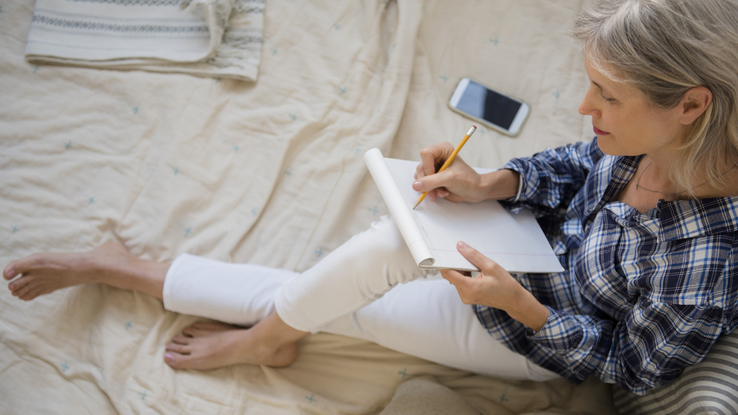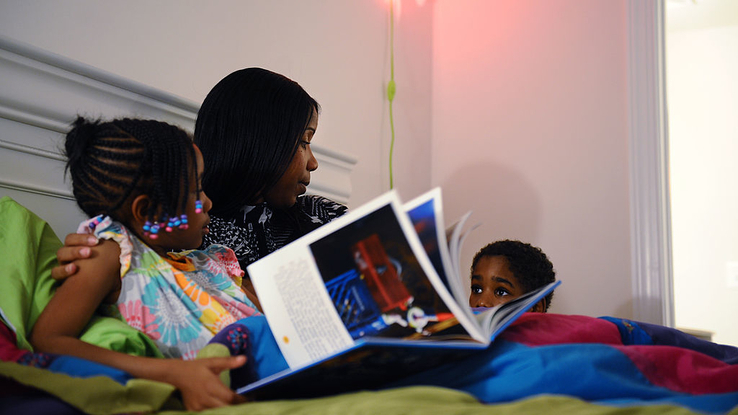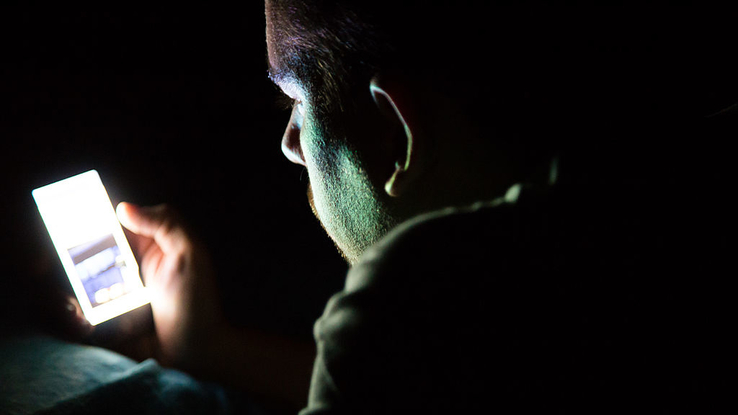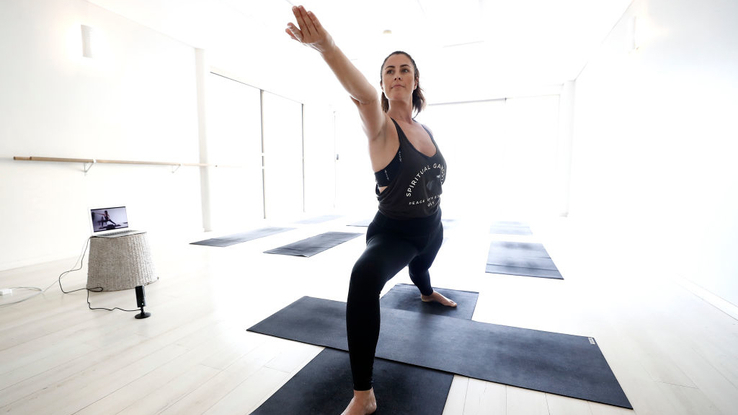Why Do I Wake Up Easy on the Couch but Not in Bed

Sleep is essential for health. Eighteen- to 60-year-olds need 7 hours or more a night, while older and especially younger people often require even more. Even so, across age groups, many Americans struggle to get their recommended amount of shuteye. Sometimes, the mind and body just won't cooperate no matter how obvious it is that you need to turn in for the night.
The secret to falling asleep isn't always easy to find, but there are a few things you can do to put your brain and body at ease and relax before bed. While you should consult a doctor if your lack of sleep begins to significantly impact your well-being, these tips will be enough to help most people get the sleep they need to make it through the day.
When you're worried about your job, finances, family or even just errands that need to be completed , you may find yourself lying awake at night thinking about all the problems awaiting you the next day. You might end up worrying over the same questions over and over again until you don't feel tired at all, which in turn can leave you exhausted the next day when you actually have the chance to do something about those problems.

To prevent those thoughts from disturbing your sleep, try and take 10 to 15 minutes before bed to write down why you are worried and any possible solutions that you can come up with. By setting your problems down in writing, you no longer have to worry about keeping them all in your mind, leaving tomorrow's affairs where they belong and freeing up your mind for drifting into sleep. Just be sure to jot down your problems well before bedtime so that the activity doesn't cause you to dwell even more on what you have to do tomorrow.
Set a Sleep Schedule and Stick to It
If you're having difficulty getting regular sleep, this suggestion can seem particularly frustrating. After all, if going to sleep at a time of your own choosing was an option, you wouldn't be looking for advice on how to fall asleep. However, there's something to be said for setting aside a consistent time for sleep and trying to stick to it, even if you're struggling for the time being. By keeping a strict schedule and letting it vary by no more than an hour on weekends, you help reinforce your body's natural sleep cycle, which in turn makes going to sleep easier.

You'll need to be proactive in taking steps to preserve your sleep schedule. Set aside about half an hour before sleep to allow your mind and body to wind down, and get in the habit of performing calming activities, such as reading a book or taking a bath, before bed. This will help form an association between the activity and sleep in your mind. Similarly, avoid activities that keep you up. If you have a bad habit of endlessly scrolling through your phone when you should be sleeping, make sure to put it in another room well before you intend on sleeping.
If you're still struggling to sleep after 20 minutes, however, don't be afraid to get up and do something else relaxing until you feel drowsy again. In addition to attuning your mind and body to a set sleep schedule, you also want them to connect your bedroom with sleep, so avoid being there when you aren't sleepy. That goes for the day as well as well as late nights when you can't sleep, too — you shouldn't be spending your waking hours in your bedroom if you can help it.
Avoid Indulging Before Bed
The cliche of a midnight snack can seem both appealing and fairly normal — after all, who doesn't like a small bowl of ice cream to round out the night? However, both food and drinks before bed can end up keeping you tossing and turning well into the night. While the feeling of being full can be satisfying in the moment, it often comes at the cost of endless tossing and turning later as your body digests what you ate. That discomfort can be enough to keep you from drifting off to sleep. Additionally, what feels like nighttime hunger may just be sleepiness, so you might not even be hungry in the first place.

You should also avoid caffeine or nicotine before bed, as both are stimulants that can keep you up for hours afterward. If you drink coffee or cola, for instance, only half of the total caffeine in the beverage will be out of your system after 6 hours have passed. And while you may feel like alcohol makes it easier to sleep, you're likely to be more restless and get far worse quality sleep after partaking.
Create a Good Environment for Sleep
You may not realize it, but a bed in a dark room isn't always a healthy sleeping environment. A blinking light from a laptop, street noise outside your window or even just a bad mattress can all undermine your efforts to sleep, so it's important to identify things in your room that could be keeping you up and remove them.

The first thing you should look for is light from electronic devices, such as video screens or even LEDs in computer cords and other common electronics. These devices emit what is known as blue light. While it's more energy efficient and even beneficial during the day, blue light at night has been shown to significantly impact both how easily people can fall asleep and the quality of the rest they get afterward. Because of this, you should turn off computers and TVs, unplug cords with indicator LEDs and keep your phone flipped onto its screen (or better yet, not even in the room) before bed.
That's not all, though. Shades or curtains to keep out car- or sunlight can keep out other sources of light, while earplugs deafen unwanted noise. You should also aim for a bedroom temperature of around 60 and 67 degrees. Combined with blankets, this can help you avoid waking in the middle of the night from being too hot or cold. The body also naturally cools as it prepares for sleep, and lower temperatures may help to encourage this process.
Perform Sleep Exercises — Both Figurative and Literal
Counting sheep to help induce sleep is an old tactic, but one that works. By focusing on a simple mental task, you help quiet your mind and shed worries or anxieties that could be keeping you from sleeping. And keep in mind that counting sheep is just one option available to you. You can count the number of groceries in your pantry, recite a poem or song lyrics, or picture a particular place or object in great detail. As long as it keeps your mind preoccupied, it should help.

You also consider trying muscle relaxation exercises. Starting with your toes, try tensing and relaxing the muscles in your body one by one while breathing deeply in and out. This process not only relaxes the body, but also the mind, as it can help you let go of anxieties and racing thoughts.
And speaking of exercise, it can also help to perform vigorous physical activity earlier in the day. While exercising too close to bedtime can keep you up, working out a few hours beforehand can tire the body while giving you enough time to also calm your mind. You can also do yoga or other forms of light exercise closer to sleep to help relax the muscles, but you'll still want a bit of a buffer zone.
Resource Links:
https://www.cdc.gov/sleep/about_sleep/how_much_sleep.html
https://psychcentral.com/lib/12-ways-to-shut-off-your-brain-before-bedtime/
https://www.mayoclinic.org/healthy-lifestyle/adult-health/in-depth/sleep/art-20048379
https://my.clevelandclinic.org/health/articles/15496-caffeine-tips-for-breaking-the-habit
https://www.health.harvard.edu/staying-healthy/blue-light-has-a-dark-side
https://health.clevelandclinic.org/what-is-the-ideal-sleeping-temperature-for-my-bedroom
https://www.nhs.uk/live-well/sleep-and-tiredness/how-to-get-to-sleep/
Source: https://www.thehealthfeed.com/healthy-living/tricks-relax-before-bed?utm_content=params%3Ao%3D1668962%26ad%3DdirN%26qo%3DserpIndex&ueid=4ad5c574-d838-4a55-bdfc-6d5262443e49
0 Response to "Why Do I Wake Up Easy on the Couch but Not in Bed"
Post a Comment